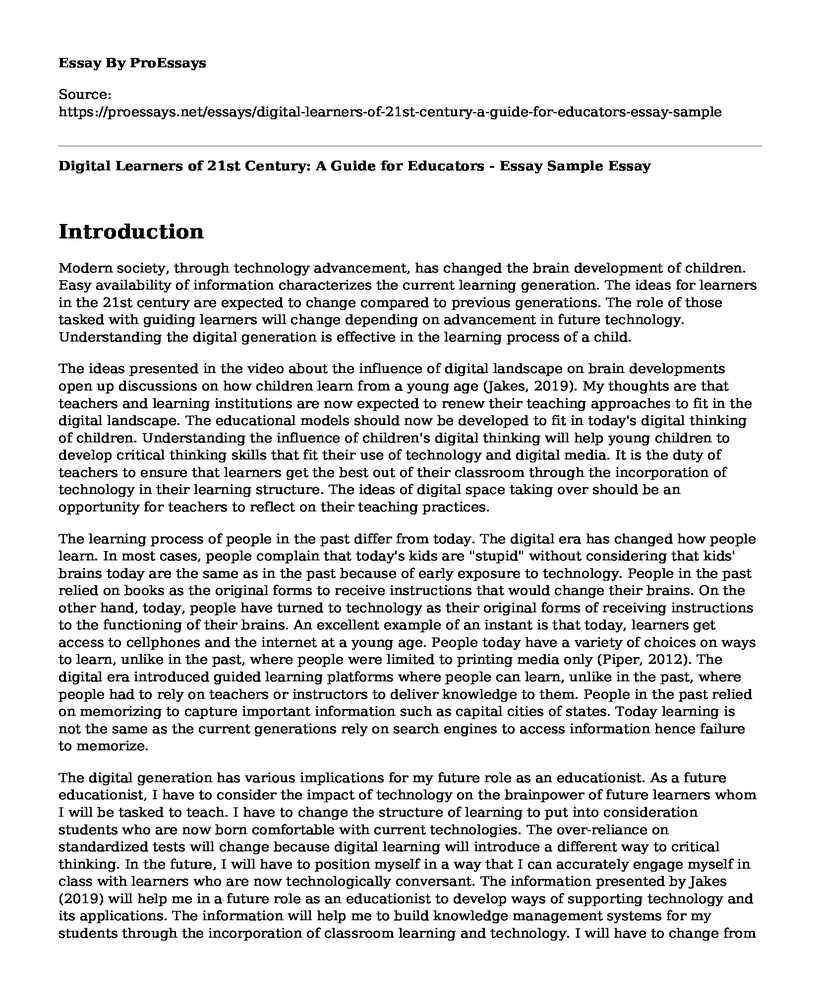Introduction
Modern society, through technology advancement, has changed the brain development of children. Easy availability of information characterizes the current learning generation. The ideas for learners in the 21st century are expected to change compared to previous generations. The role of those tasked with guiding learners will change depending on advancement in future technology. Understanding the digital generation is effective in the learning process of a child.
The ideas presented in the video about the influence of digital landscape on brain developments open up discussions on how children learn from a young age (Jakes, 2019). My thoughts are that teachers and learning institutions are now expected to renew their teaching approaches to fit in the digital landscape. The educational models should now be developed to fit in today's digital thinking of children. Understanding the influence of children's digital thinking will help young children to develop critical thinking skills that fit their use of technology and digital media. It is the duty of teachers to ensure that learners get the best out of their classroom through the incorporation of technology in their learning structure. The ideas of digital space taking over should be an opportunity for teachers to reflect on their teaching practices.
The learning process of people in the past differ from today. The digital era has changed how people learn. In most cases, people complain that today's kids are "stupid" without considering that kids' brains today are the same as in the past because of early exposure to technology. People in the past relied on books as the original forms to receive instructions that would change their brains. On the other hand, today, people have turned to technology as their original forms of receiving instructions to the functioning of their brains. An excellent example of an instant is that today, learners get access to cellphones and the internet at a young age. People today have a variety of choices on ways to learn, unlike in the past, where people were limited to printing media only (Piper, 2012). The digital era introduced guided learning platforms where people can learn, unlike in the past, where people had to rely on teachers or instructors to deliver knowledge to them. People in the past relied on memorizing to capture important information such as capital cities of states. Today learning is not the same as the current generations rely on search engines to access information hence failure to memorize.
The digital generation has various implications for my future role as an educationist. As a future educationist, I have to consider the impact of technology on the brainpower of future learners whom I will be tasked to teach. I have to change the structure of learning to put into consideration students who are now born comfortable with current technologies. The over-reliance on standardized tests will change because digital learning will introduce a different way to critical thinking. In the future, I will have to position myself in a way that I can accurately engage myself in class with learners who are now technologically conversant. The information presented by Jakes (2019) will help me in a future role as an educationist to develop ways of supporting technology and its applications. The information will help me to build knowledge management systems for my students through the incorporation of classroom learning and technology. I will have to change from a dispenser of information and instead become a facilitator. My role will change because, with technology, most students are already getting information.
Conclusion
The learning process of children will continue to change in the future due to the introduction of the digital era at a young age. It is therefore recommended that institutions should focus on incorporating technology into the classroom as facilitators. Information is now flooded, and the role of educationists as facilitators is paramount in ensuring that learners get the best out of digital generation.
References
Jakes, I. (2019). History - YouTube. Retrieved 12 December 2019, from https://www.youtube.com/feed/history
Piper, T. (2012). Making meaning, making sense: Children's early language learning. Retrieved from https://content.ashford.edu/
Cite this page
Digital Learners of 21st Century: A Guide for Educators - Essay Sample. (2023, Mar 17). Retrieved from https://proessays.net/essays/digital-learners-of-21st-century-a-guide-for-educators-essay-sample
If you are the original author of this essay and no longer wish to have it published on the ProEssays website, please click below to request its removal:
- Essay Example on UAE Nuclear Plant: 5600MW Source of Energy for the UAE
- Research Paper on Negative Impact of Standardized Testing in Texas
- Essay Sample on Exploring Innovation Approaches to Increase Profits & Productivity
- Essay on Gaining Language Skills for Personal and Community Growth Through ESL
- Paper Example on Nursing Student: Building Trust & Easing Anxiety for Pediatric Patients & Parents
- Developing Critical and Creative Thinking Skills for Success - Essay Sample
- Essay on Promoting Wellness & Wellbeing in Early Childhood: Identifying Socialisation Influences & Strategies







